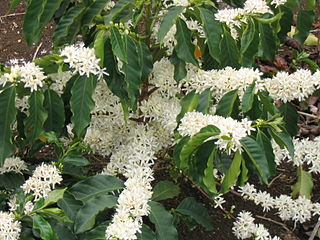
Coffea is a genus of flowering plants in the family Rubiaceae. Coffea species are shrubs or small trees native to tropical and southern Africa and tropical Asia. The seeds of some species, called coffee beans, are used to flavor various beverages and products. The fruits, like the seeds, contain a large amount of caffeine, and have a distinct sweet taste.

Caffeine is a central nervous system (CNS) stimulant of the methylxanthine class. It is mainly used as a eugeroic (wakefulness promoter) or as a mild cognitive enhancer to increase alertness and attentional performance. Caffeine acts by blocking binding of adenosine to the adenosine A1 receptor, which enhances release of the neurotransmitter acetylcholine. Caffeine has a three-dimensional structure similar to that of adenosine, which allows it to bind and block its receptors. Caffeine also increases cyclic AMP levels through nonselective inhibition of phosphodiesterase.

Starbucks Corporation is an American multinational chain of coffeehouses and roastery reserves headquartered in Seattle, Washington. It was founded in 1971, and is currently the world's largest coffeehouse chain.

Frappuccino is a line of blended iced coffee drinks sold by Starbucks. It may consist of coffee or crème base, blended with ice and ingredients such as flavored syrups and usually topped with whipped cream and or spices. It may also include blended Starbucks refreshers. Frappuccinos are also sold as bottled coffee beverages in grocery stores, convenience stores and from vending machines.

Coffee is a beverage brewed from roasted coffee beans. Darkly colored, bitter, and slightly acidic, coffee has a stimulating effect on humans, primarily due to its caffeine content. It has the highest sales in the world market for hot drinks.

A caffeinated drink, or caffeinated beverage, is a drink that contains caffeine, a stimulant that is legal practically all over the world. Some are naturally caffeinated while others have caffeine added as an ingredient.
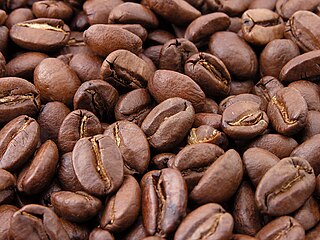
A coffee bean is a seed from the Coffea plant and the source for coffee. It is the pit inside the red or purple fruit. This fruit is often referred to as a coffee cherry, and like the cherry, it is a fruit with a pit. Even though the coffee beans are not technically beans, they are referred to as such because of their resemblance to true beans. The fruits most commonly contain two stones with their flat sides together. A small percentage of cherries contain a single seed, called a "peaberry". Peaberries make up only around 10% to 15% of all coffee beans. It is a fairly common belief that they have more flavour than normal coffee beans. Like Brazil nuts and white rice, coffee beans consist mostly of endosperm.

A caffè mocha, also called mocaccino, is a chocolate-flavoured warm beverage that is a variant of a caffè latte, commonly served in a glass rather than a mug. Other commonly used spellings are mochaccino and also mochachino. The name is derived from the city of Mokha, Taiz Governorate, Yemen, which was one of the centres of early coffee trade. Like latte, the name is commonly shortened to just mocha.

Argo Tea began as a chain of tea cafes that was founded in the Lincoln Park community area in Chicago, Illinois, in June 2003. It was headquartered in Chicago's Loop community area. It had more than a dozen locations in the Chicago metropolitan area before expanding in 2010 to New York City, where it opened four locations that year and then expanded to St. Louis and Boston. As of October 2011 the chain had 26 locations and distribution in over 3,000 grocery stores. In its first decade, it has grown simultaneously with the tea market. Its expansion into grocery stores occurred in 2010 and 2011. Arsen Avakian is the current chief executive officer. By spring 2013, it had opened in Beirut with plans to add locations in five Middle East cities by year end.

The history of coffee dates back centuries in Ethiopia and Yemen. It was already known in Mecca in the 15th century. Also, in the 15th century, Sufi monasteries in Yemen employed coffee as an aid to concentration during prayers. Coffee later spread to the Levant in the early 16th century; it caused some controversy on whether it was halal in Ottoman and Mamluk society. Coffee arrived in Italy the second half of the 16th century through commercial Mediterranean trade routes, while Central and Eastern Europeans learned of coffee from the Ottomans. By the mid 17th century, it had reached India and the East Indies.
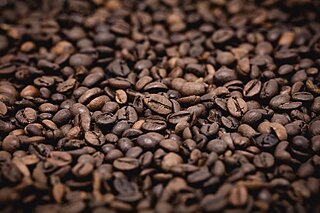
Coffee is a popular beverage and an important commodity. Tens of millions of small producers in developing countries make their living growing coffee. Over 2.25 billion cups of coffee are consumed in the world daily. Over 90 percent of coffee production takes place in developing countries — mainly South America — while consumption happens primarily in industrialized economies. There are 25 million small producers who rely on coffee for a living worldwide. In Brazil, where almost a third of the world's coffee is produced, over five million people are employed in the cultivation and harvesting of over three billion coffee plants; it is a more labor-intensive culture than alternative cultures of the same regions, such as sugar cane or cattle, as its cultivation is not automated, requiring frequent human attention.
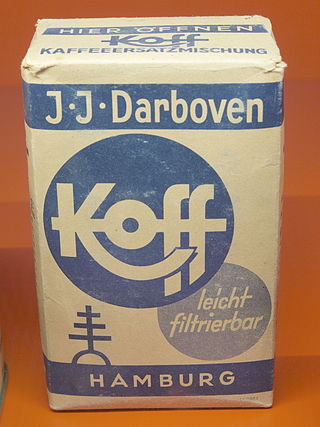
Coffee substitutes are non-coffee products, usually without caffeine, that are used to imitate coffee. Coffee substitutes can be used for medical, economic and religious reasons, or simply because coffee is not readily available. Roasted grain beverages are common substitutes for coffee.
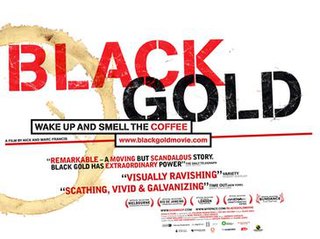
Black Gold is a 2006 documentary film that follows the efforts of an Ethiopian coffee union manager as he travels the world to obtain a better price for his workers' coffee beans. The film was directed and produced by Marc James Francis and Nick Francis from Speakit Films, and co-produced by Christopher Hird. It premiered at the 2006 Sundance Film Festival.
Tata Coffee was an Indian company that produced coffee, tea, pepper and related products. It was a subsidiary of Tata Consumer Products, and part of the Tata Group. Tata Coffee was merged with Tata Consumer Products on 1 January 2024.

Coffee cherry tea is an herbal tea made from the dried skins and/or pulp of the fruit of the coffee plant that remain after the coffee beans have been collected from within. It is also known as cascara, from the Spanish cáscara, meaning "husk". It is similar to a traditional beverage in Yemen and Ethiopia. Starting about 2005 it was independently developed and promoted for export by Salvadoran coffee farmer Aida Batlle. The dried whole fruits are also eaten like raisins.
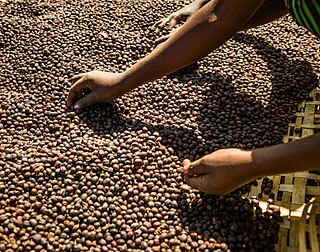
Coffee production in Ethiopia is a longstanding tradition which dates back dozens of centuries. Ethiopia is where Coffea arabica, the coffee plant, originates. The plant is now grown in various parts of the world; Ethiopia itself accounts for around 17% of the global coffee market. Coffee is important to the economy of Ethiopia; around 30-35% of foreign income comes from coffee, with an estimated 15 million of the population relying on some aspect of coffee production for their livelihood. In 2013, coffee exports brought in $300 million, equivalent to 24% of that year's total exports.

A caffeinated alcoholic drink is a drink that contains both alcohol and a significant amount of caffeine. Caffeine, a stimulant, masks some of the depressant effects of alcohol. However, in 2010 and 2011, this type of drink faced criticism for posing health risks to its drinkers. In some places there is a ban on caffeinated alcoholic drinks.

Mazagran is a cold, sweetened coffee drink that originated in Algeria. Portuguese versions may use espresso, lemon, mint and rum, and Austrian versions are served with an ice cube and include rum. Sometimes a fast version is achieved by pouring a previously sweetened espresso in a cup with ice cubes and a slice of lemon. Mazagran has been described as "the original iced coffee".

The Argentine tea culture is influenced by local and imported varieties and customs. The country is a major producer of tea, but is best known for the cultivation and consumption of mate, made with the leaves of the local yerba mate plant.
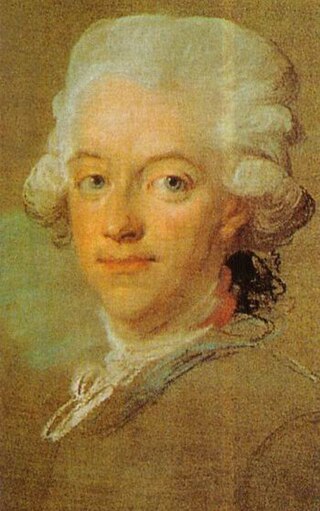
Gustav III of Sweden's coffee experiment was a purported twin study ordered by the king to study the health effects of coffee. The authenticity of the event has been questioned. The primitive medical study, supposedly conducted in the second half of the 18th century, failed to prove that coffee was a dangerous beverage.



















